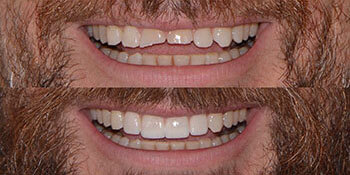Oral Surgery Toronto
Oral surgery services at City Oasis Dental includes the diagnosis and the surgical and related treatments needed - including for injuries and defects involving both the functional and aesthetic aspects of the hard and soft tissues of the head, mouth, teeth, gums, jaw, and neck.
It involves, but is not limited to: wisdom teeth removal, apicoectomy, TMJ disorder, facial trauma, corrective jaw surgery, oral pathology, dental implants, osseous tissue surgery, anesthesia, and bone grafts.
The first step is to book a consultation to determine if oral surgery is the right solution for your case; call City Oasis Dental in Toronto at 647-980-1200.
What is oral surgery?
Oral surgery is any surgical procedure performed to your teeth, jaw, gums, or other oral structures. This includes tooth extractions, implants, jaw surgeries, and gum grafts. Oral surgeries are typically performed by an oral surgeon or periodontist.
Patients might require oral surgery if they need to have their wisdom teeth removed, if they experience trauma to the teeth or jaw area, or if they have severe infections or tooth decays that lead to gum disease and other infections.
Oral surgeons might also perform operations like soft tissue biopsies, tumor removal, soft tissue repairs, jaw realignment surgery, and positioning of implants. Oral surgeries are typically invasive and involve using dental instruments to remove or reconstruct areas of the mouth or jaw. However, oral surgery is generally safe when performed by a professional and with the use of anesthesia.
How long does it take for oral surgery to heal?
It depends on the type of oral surgery you get. After a tooth extraction, blood clots will begin forming at the extraction site within the first 24 hours. You might experience bleeding, pain, and swelling as the area heals.
About three days after the surgery, your gums start to heal and close around the removal site. It’s important that the surgery site stays clean throughout this process. You should be almost fully healed after a week to 10 days of the tooth extraction. Your gums should no longer feel tender or swollen at this point.
Everyone heals differently, as it’s normal for the body to react differently to surgery. However, if you notice excessive bleeding, a fever, or persistent pain and swelling, you should contact your dentist.
What are the types of dental surgery?
The most common type of dental surgery is tooth extractions, such as wisdom teeth removal surgery. You can have one or more teeth removed if they are decayed, severely infected, broken or chipped, or if your mouth is overcrowded.
Dental bone grafts or dental implants are also common dental surgeries. A bone graft is necessary if there’s bone loss in your jaw. This can be caused by a lack of nutrients in the nerves of your jaw because of missing teeth. Dental implants are performed to replace your natural teeth after its removal.
Other types of dental surgery include corrective jaw surgery, sleep apnea surgery, periodontal surgery, cleft lip and palate repair, and oral cancer surgery.
How long is the gum grafting procedure?
Gum grafting procedure typically takes around 1 to 1.5 hours from start to finish. The actual surgery takes around 45 minutes, but you can expect to stay longer because you have to wait for the local anesthesia to become effective.
What to eat after oral surgery?
It’s best to eat liquid or soft foods right after an oral surgery. You can have soup, soft fruits, mashed potatoes, applesauce, yogurt, and eggs are all great to reduce pressure on the surgery site and promote healing. Most people can resume normal eating habits two weeks after surgery.

